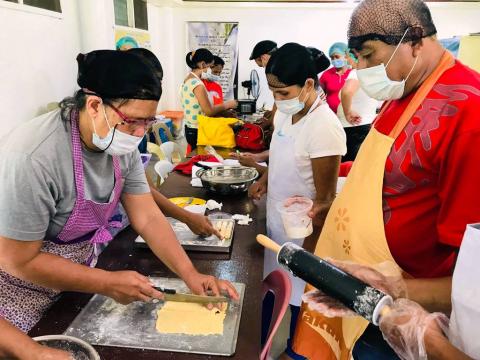Participants of the cassava processing and utilization training ensures food safety and food handling by wearing hygienic masks, hairnets and aprons.
TALAM’S FLORAE, Plaridel, Misamis Occidental---For the Agricultural Training Institute (ATI), gone were the days engaging its farmers in production and propagation of crops alone. Meeting the demands and needs of the market here and overseas as well as upgrading knowledge and value-adding of agricultural goods are some of today’s priority initiatives of the institute.
With that in mind, a training on cassava processing was organized recently to provide necessary knowledge on product development and processing to the 29 cassava farmers and members of the Rural Improvement Clubs (RICs). Dubbed as “Training on Cassava Processing and Utilization in support to GAD”, the three-day event intended to address the challenge facing the agricultural processing sector through agribusiness and marketing to the consumer. Product diversification through food processing, improved quality and safety were some of the known solutions.
The training as organized and facilitated by Training Specialist II Noriel Kris O. Santillan aimed to develop a value-adding strategy through food processing, product development and evaluation, good manufacturing practices, and also integrating business management concepts in farm processing operations.
Topics and scope of the training include the status of cassava industry in the Philippines, principles and concept of food processing, food safety, and Good Manufacturing Practices (GMP), the importance of designing label and packaging, and computation of product costing and pricing.
The training-participants were able to come up with delectable cassava-based products such as cassava pancakes, cassava rolls, cacharon (or cassava chicharon), cassava tarts, and cassava sticks.
The three-day training transpired on August 29-31, 2018 at Talam’s Florae in Looc, Plaridel, Misamis Occidental. (with reports from Noriel Kris O. Santillan, Training Specialist II)

